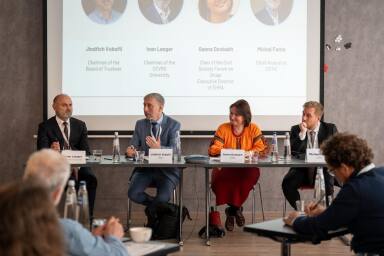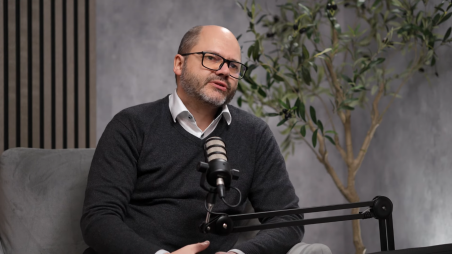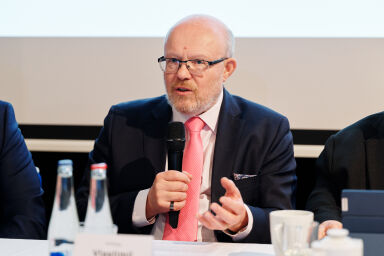The government is ready to help domestic pharmaceutical manufacturers in areas such as supporting research and development. At the same time, according to Prime Minister Petr Fiala, it would be appropriate to create conditions in our country so that private entities start to participate in research carried out in public institutions. He said this at the 2nd annual Technology and Innovation in Health Summit of the Healthcare Daily, which was held on 29 and 30 March in Prague.
The medicine shortages that hit not only the Czech Republic but also the EU in general this winter have shown how dependent Europe is on supply chains in Asia. European countries have therefore now agreed on the need to get rid of this dependence. And the Czech government does not want to be left behind.
„I have discussed with the management of Zentiva what we can do to ensure that Czech medicine manufacturers have better conditions to support the availability of medicines. We agreed that we need to set up a better coordination mechanism between the state and domestic drug manufacturers and eliminate the problems that the local pharmaceutical industry is facing. We are ready to help pharmaceutical manufacturers in certain areas, such as support for research and development, which is an important element. The Czech Republic is also involved in multinational initiatives that seek ways to make us less dependent on non-European manufacturers of active pharmaceutical ingredients. We are firmly resolved within the EU that we must get rid of our strategic dependence on Eastern suppliers, which are often not reliable in terms of economics and safety,“ says Petr Fiala.

This effort is fully supported by the largest drug manufacturer in the Czech Republic, Zentiva. It is therefore trying to increase its production capacity, which is now almost at its maximum.
„Every year we invest tens to hundreds of millions in capacity maintenance, innovation and new technologies that will increase the capacity to produce quality medicines for Czech patients. We are open to working with the Prime Minister and the entire government because we are not able to tackle the problem alone – we need political support. Returning the production of active substances to Europe is not just a question of money, but also of laws regarding ecology and so on. We need to do everything we can to make sure that we are not so dependent on Asian (supply) chains,“ says Zentiva CEO Boris Sananes (we also covered how we could better prevent drug shortages in the Czech Republic here).

In addition to the availability of medicines, according to Prime Minister Fiala, the government’s priority is also the sustainability of the health care system in various aspects (the other two priorities are prevention and access to health care, which we wrote about in more detail here).
„Long-term sustainability is also important in the area of innovative medicines. The government should support research, look for internal savings and efficiency. Stabilization of the system through an indexation mechanism of payments for state insureds should also contribute to the availability of new medicines. However, a fundamental role is played by health insurance companies, which must look for innovative ways of financing drug policy and carry out budget impact analyses for the newest drugs entering the market. The role of the government should not be to manage the whole process, but to create legislative conditions in terms of economic sustainability. The duty of the government is also to create the right conditions for innovation and support for research. In the Czech Republic, we have a gap here. It is not just about research supported by public funds, but we must create conditions so that private entities are also involved in research. However, it should not be the case that research is either public or private, but it should be attractive for private entities to participate in research or to fund it in public institutions. The Czech Republic has reserves here and the state must help with its decisions,“ says Petr Fiala.
Mohlo by vás zajímat

The largest Czech health insurer (VZP; General Health Insurance Company) has already done a great deal of work on the sustainability of healthcare, especially in the area of medicine policy.
„The past has shown that VZP, as well as colleagues from other health insurance companies, know how to work with costs in the area of medicine policy. It is one of the areas where we have mastered the process of entering innovation, we have clear rules, we know how to work with cost management and contractual mechanisms that are in the risk-sharing group. We can also work with generics and biosimilars. So it’s about health insurers taking a proactive, prudent approach to highly innovative products, but also methods, and also with a high level of affordability. Recently, we ranked 12th in Europe in highly innovative medicines, which is a very good sign of the work of insurance companies. It also gives us faith that when we work with gene therapies and personalised medicine, we will succeed as we have in recent years,“ points out VZP Director Zdeněk Kabátek.

Personalised medicine will be a challenge, but it should bring with it more effective treatment and savings on therapies that would not work for a given patient.
„Personalised healthcare is really critical to how we bridge the gap between the need to bring highly innovative treatments to Czech citizens as well as… the sustainability of the healthcare system. It can be a very complicated topic, but at it’s essence it’s about finding the right intervention for the right patient at the right time, and then creating a learning system in which we can learn from the success of what we have done so that it continues to improve. I firmly believe that in building that type of ecosystem within the Czech healthcare system, we build more resilience and we eliminate more waste and ultimately create a much more sustainable future, and importantly, better health outcomes for patients. Personalized healthcare, I think, is the only way forward,“ says Roche CZ General manager Erik Lundgren.

On the other hand, the implementation of this treatment is not easy. „Personalised medicine is quite demanding in terms of organising treatment and financing it, so it is a big challenge. It is certainly a way forward, but I know from the education sector that personalisation is very demanding in terms of the quality of teachers, changing the way they work, financially and in all other aspects – and it is similar in medicine,“ said Prime Minister Fiala.



-mk-
Photo by Radek Čepelák
The Healthcare Daily would like to thank Roche, Zentiva, ORCZ, Medtronic, Medicalc, Novartis, Alk, Akeso, EUC, MyCom, Satum and the health insurance companies VZP, ZP MV and RBP for their support of the summit.







